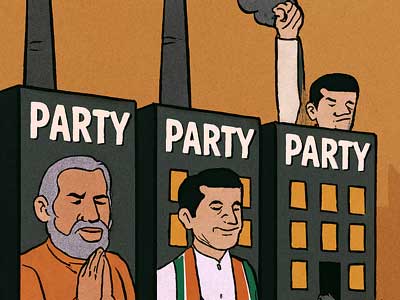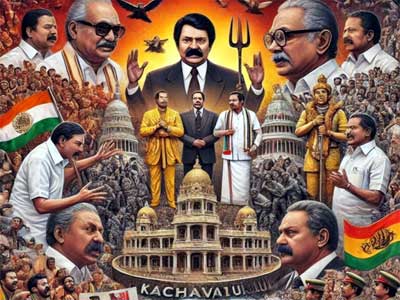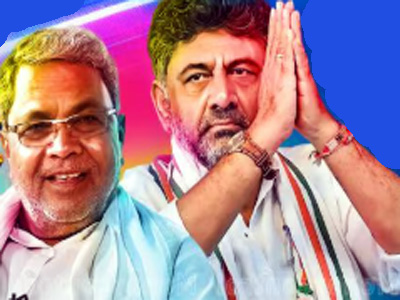India currently boasts a staggering 2,827 registered political parties. Among them are six national parties, 58 state-level outfits, and an astonishing 2,763 unrecognised ones, according to the Election Commission’s report from March 2024. Aside from the elevation of Jana Sena to state-party status in January 2025, little has changed in this crowded landscape.
But with so many players in the electoral field, why does faith in the democratic process remain so fragile? Why are attacks on electoral integrity so relentless and recurring?
Read in Hindi: विरासतपरस्ती और जमींदारी ने लोकतंत्र को बनाया गिरवी
Today, Indian democracy, by design or by accident, resembles a tightly-knit cartel where politics has become both a family inheritance and a playground for the rich. What was once a vision of freedom, equality, and justice now plays out more like a corporate marketing strategy. Elections have lost their festive shine and become elaborate dramas, with the voter reduced to a passive spectator. Real power is hoarded by a handful of dynastic families; the spirit of the Constitution is gasping for breath.
Where government was once for the people, it has now morphed into a company, quietly controlled by clans and financiers. As sociologist TP Srivastava puts it, “Most Indian political parties today resemble private limited companies. Ownership is inherited. Leadership is appointed, not elected. As for accountability, well, that’s simply absent. The party headquarters runs like a corporate office, the working committee is a family board, and annual meetings are more like succession rituals than democratic exercises. The common voter is just a shareholder; no real rights, no voice, just receipts for broken promises.
Just look around. The Congress resembles a family trust. Sonia Gandhi is the honorary chairperson, Rahul Gandhi the perennial managing director, and Priyanka Gandhi the party’s brand ambassador. Party loyalty outweighs capability, and genuine internal elections are a distant memory.
Uttar Pradesh’s Samajwadi Party is now effectively Akhilesh Yadav Pvt Ltd, power transferred seamlessly from father to son in a kin-only conclave, while nearly half the party’s 2022 candidates were relatives. Mayawati’s Bahujan Samaj Party is registered under her name and company, with the only real spectacle being her birthday celebrations.
Shiv Sena’s saga in Maharashtra could rival a corporate thriller, from Bal Thackeray to Uddhav to Eknath Shinde’s ‘hostile takeover’, where the Election Commission validated the faction with more MLAs, politics has boiled down to market value, not ideology.
Bihar’s Rashtriya Janata Dal, under Lalu Yadav, hands out tickets to family, while the DMK in Tamil Nadu thrives as a family estate. Meanwhile, the AIADMK is still locked in succession feuds.
Even Karnataka’s Janata Dal (Secular) is a family asset, where, in 2024, even those facing serious charges retained their family-backed tickets. Only Kerala’s CPI(M) still conducts internal polls, though even there, family ties pull more weight than ideology.
Political commentator Prof Paras Nath Chaudhary notes, “Laws meant to curtail defection and horse-trading have simply become tools for mergers and acquisitions. From Maharashtra to Madhya Pradesh to Manipur, governments topple and rise overnight. Legislative speakers function less like constitutional authorities and more like corporate secretaries, validating whichever boardroom controls the numbers.”
The Election Commission, once a constitutional gatekeeper, now stands reduced to a registrar of political ventures. Between 2019 and 2023, Indian parties amassed nearly ₹15,000 crore in donations, 70 per cent via anonymous electoral bonds, later struck down by the Supreme Court, but only after the forensic trails had faded.
Parties still operate outside the reach of the Right to Information Act; recommendations for internal democracy gather dust in government files. Party offices look more like cutting-edge corporate centres than grassroots hubs; their halls echo with data analysts, media managers, and branding consultants. Election campaigns are meticulously crafted product launches. Behind every slogan is crunchable data; behind every alliance, a sealed deal. As the power index soars, public trust plummets.
This is not democracy, it’s feudalism with spreadsheets. The true currency, money, propaganda, and power. The true cost, the public’s trust. And when politics becomes property, dissent becomes a kind of crime.
India’s republic still breathes, but its pulse is weak. Until political dynasties open their books to the people and embrace accountability, the voter remains a shareholder who will never receive dividends. What India needs is new politics, open, clean, and truly answerable to its citizens.
















Related Items
A social revolution India has been waiting for…
The Great Urban Predicament: India's Catch-22…
India is rapidly changing in the era of AI...